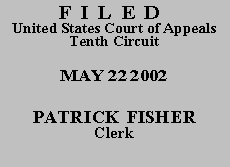

| TADD ALAN YORK,
Petitioner - Appellant, v. MIKE ADDISON, Warden, Respondent - Appellee. |
|
Petitioner Tadd Alan York, an inmate in the custody of the Oklahoma Department of Corrections, seeks a certificate of appealability to challenge the district court's rejection of his habeas corpus petition. Because he has failed to make a "substantial showing of the denial of a constitutional right," as required by 28 U.S.C. § 2253(c)(2), we deny Mr. York's request and dismiss his appeal.
Prison officials accused Mr. York of misconduct and placed him in a segregated cellblock where Mr. York was subjected to greater confinement and fewer privileges. Before entering what the prison calls the Restricted Housing Unit, Mr. York received earned-time credits at Level 4, the highest level of accrual. Immediately upon entering the Restricted Housing Unit, he was knocked to Level 1, the lowest level of accrual. Soon after his release he was transferred to a different prison where he remained at Level 1 accrual status. Carrying that accrual status to his new prison, he was not restored to Level 4 status for more than 200 days.
Mr. York asserts that prison authorities violated his due process rights by punishing him without providing him either written notice of his infraction or a hearing at which he could contest the accusations leveled against him. He seeks these and other procedural protections to which he says he is entitled under Wolff v. McDonnell, 418 U.S. 539, 564-66 (1974) (holding that prisoners punished by loss of good time credits must receive (1) written notice of the charges brought against an inmate at least twenty-four hours before the hearing; (2) the opportunity to call witnesses and present evidence at the hearing; and (3) a written statement of the factfinder as to the evidence relied on and the reasons for the disciplinary action taken). He recognizes, as he must, that the due process protections explained in Wolff arise only if he has been deprived of a liberty interest. Sandin v. Conner, 515 U.S. 472, 487 (1995); see Reply Br. at 2. Concluding that Mr. York lacked any such liberty interest, the state court rejected his post-conviction motion. The federal district court agreed and denied Mr. York's habeas corpus petition. Mr. York seeks to appeal that decision.
As the state court recognized, Sandin v. Conner, above, guides the analysis of Mr. York's petition. In Sandin, the Supreme Court held that prison disciplinary actions required due process of law only when the restraint on liberty "imposes atypical and significant hardship on the inmate in relation to the ordinary incidents of prison life." Id. at 484. Mr. York has not demonstrated that his confinement in the Restricted Housing Unit constituted an atypical and significant hardship; indeed, Sandin concluded that a similar punishment was not protected by the due process clause. See id. at 485-86; see also Talley v. Hesse, 91 F.3d 1411, 1413 (10th Cir. 1996) (holding that prisoner lacked liberty interest in not being placed in administrative segregation).
Sandin also held that disciplinary actions that do not "inevitably affect the duration" of a prisoner's sentence are not protected by the due process clause. See Sandin, 515 U.S. at 487. Mr. York claims, and the state does not deny, that the disciplinary action he suffered temporarily diminished the rate at which he accrued earned-time credits, but he has not shown that this "inevitably" affected the duration of his sentence; at the most he has shown that it might have affected the length of his sentence. See Antonelli v. Sheahan, 81 F.3d 1422, 1431 (7th Cir. 1996) (holding loss of opportunity to earn good-time credits not constitutionally protected under Sandin); Luken v. Scott, 71 F.3d 192, 193 (5th Cir. 1995) ("mere opportunity" to earn good-time credits does not amount to liberty interest) (emphasis in original). He has thus failed to show that he was deprived of any protected liberty interest.(1)
Mr. York's request for a certificate of appealability is DENIED. His appeal is accordingly DISMISSED. His request to proceed in forma pauperis is DENIED.
Entered for the Court
Circuit Judge
*. This order and judgment is not binding precedent, except under the doctrines of law of the case, res judicata, and collateral estoppel. The court generally disfavors the citation of orders and judgments; nevertheless, an order and judgment may be cited under the terms and conditions of 10th Cir. R. 36.3.
1. Mr. York relies largely on Hughes v. Rowe, 449 U.S. 5 (1980). That case, however, held only that it was error for the district court to dismiss a prisoner's due process claim without receiving affidavits or any other evidence from prison officials responding to or explaining the facts alleged by the inmate. The Court specifically stated that its holding was "not intended to express any view" on the merits of the petitioner's due process claim. Id. at 12.